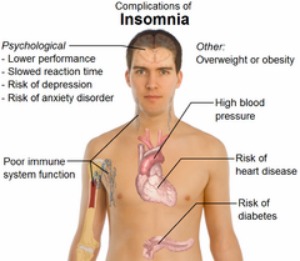Chronic sleeplessness can have many adverse effects, both physically and mentally. If not sleeping has you wondering what to do for insomnia, start with the following natural insomnia remedies before turning to drugs.
What to Do for Insomnia
- Avoid working in bed. Working signals your brain to become active, interfering with your ability to go sleep.
- Avoid watching TV or using a computer (or cell phone) for at least thirty minutes before going to bed because they can stimulate your nervous system and keep you awake. If you must use your computer at night, download a program, such as f.lux, that removes the simulating blue light from the computer screen. Alternatives to TV or a computer include listening to relaxing music while breathing deeply for 10 to 20 minutes or using self-hypnosis.
- Avoid alcohol and caffeine in the evening because they stimulate
your nervous system and can keep you awake. Some foods (especially those
containing sugar) might also interfere with sleep. To determine if a food
is affecting your sleep, keep a food diary that also notes how you
slept each night. Some foods, such as herbal teas and warm milk, may
help you sleep. The Sleep Foundation recommends kiwi, tart cherries and tart cherry juice, malted milk, fatty fish, nuts, and rice. However, eating too close to bed time can also interfere with sleep. In general, don’t eat for at least two hours before going to bed. - Put together a comfortable bed. Use a good-quality mattress and pillow, as well as other sleep products, such as knee separators or leg wedges, that give you the support you need.
- Make the bedroom as dark as possible. Too much light can interfere with sleep and your circadian rhythm. Use blackout curtains over windows or wear a sleep mask over your eyes.
- Keep the room at a comfortable temperature. The Sleep Foundation
states the best temperature for sleep is around 65 degrees Fahrenheit
(18.3 degrees Celsius), though that may vary a few degrees depending on
the person. The usual temperature recommendation for the most
comfortable sleep is 60 to 67 degrees Fahrenheit (15.6 to 19.4 degrees
Celsius). - Learn and practice ways to reduce stress and release excess tension. Daily exercise help relieves excess stress that can keep you awake. Meditation, self-hypnosis, and similar techniques can help. Regular massage also helps release tension and stress.
- Stretch gently
before bed to help release tension. For a simple routine, lie on the
floor or bed with your feet on the surface and your knees pointing up
and do the following movements:
1. Lower your knees from side to side.
2. Tilt your pelvis forward and back several times.
3. Slowly turn your
head from side to side.
4. Notice where you feel tense, and stretch that
area gently and slowly. - Use
relaxing essential oils, such as lavender or valerian, as home remedies for insomnia. Put a drop or
two on a tissue and place next to your pillow. Or use
an aromatherapy diffuser to diffuse the oils for 30 minutes before going to bed. Or do a little self massage with an aromatherapy blend for insomnia relief. - Take a warm bath before bed. Add Epsom salts and/or calming essential oils to help you relax more.
- Consider cognitive behavioral therapy (CBT) for insomnia. CBT works by teaching you to recognize and change beliefs that affect your ability to sleep and helps you change your behavior to include good sleep habits and avoid actions that interfere with sleep. (Get more information at the Mayo Clinic.)
If your sleeplessness is severe, long-term, or getting worse, work with a doctor to attempt to identify a cause and determine how to deal with insomnia in a way that works for you.
Image Credit: By Mikael Häggström [Public domain], via Wikimedia Commons
